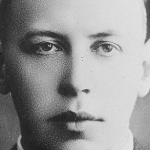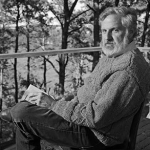(1916)
I
I found a dreadful acre of the dead,
Marked with the only sign on earth that saves.
The wings of death were hurrying overhead,
The loose earth shook on those unquiet graves;
For the deep gun-pits, with quick stabs of flame,
Made their own thunders of the sunlit air;
Yet, as I read the crosses, name by name,
Rank after rank, it seemed that peace was there;
Sunlight and peace, a peace too deep for thought,
The peace of tides that underlie our strife,
The peace with which the moving heavens are fraught,
The peace that is our everlasting life.
The loose earth shook. The very hills were stirred.
The silence of the dead was all I heard.
II
We, who lie here, have nothing more to pray.
To all your praises we are deaf and blind.
We may not ever know if you betray
Our hope, to make earth better for mankind.
Only our silence, in the night, shall grow
More silent, as the stars grow in the sky;
And, while you deck our graves, you shall not know
How many scornful legions pass you by.
For we have heard you say (when we were living)
That some small dream of good would “cost too much.”
But when the foe struck, we have watched you giving,
And seen you move the mountains with one touch.
What can be done, we know. But, have no fear!
If you fail now, we shall not see or hear.



















Comment form: